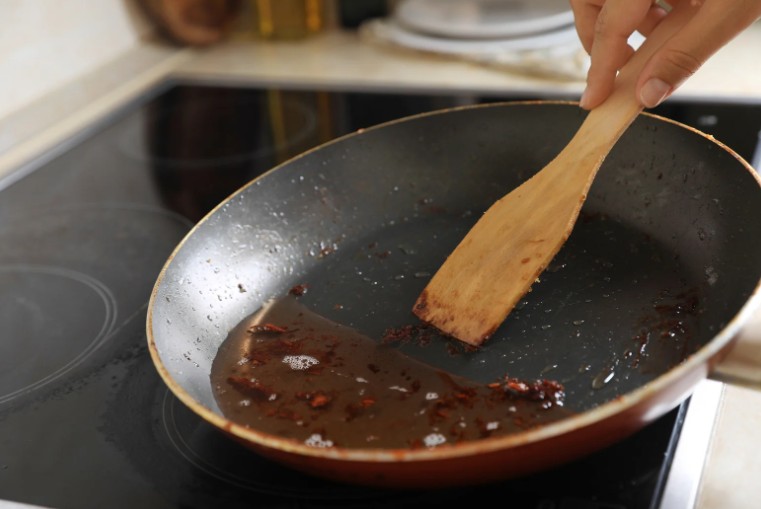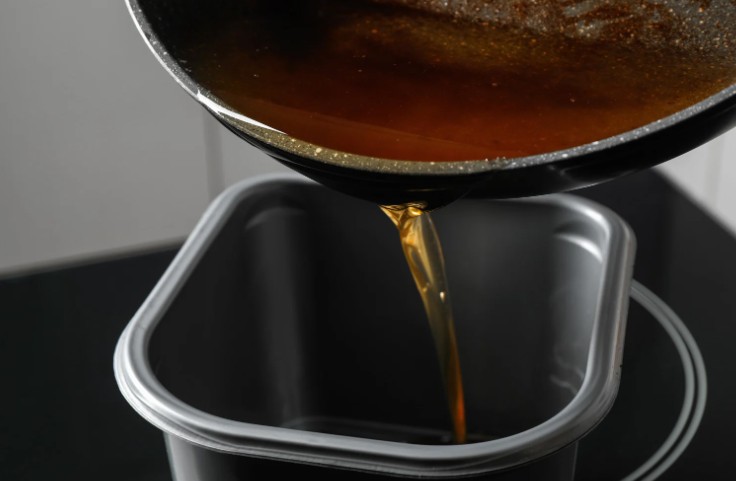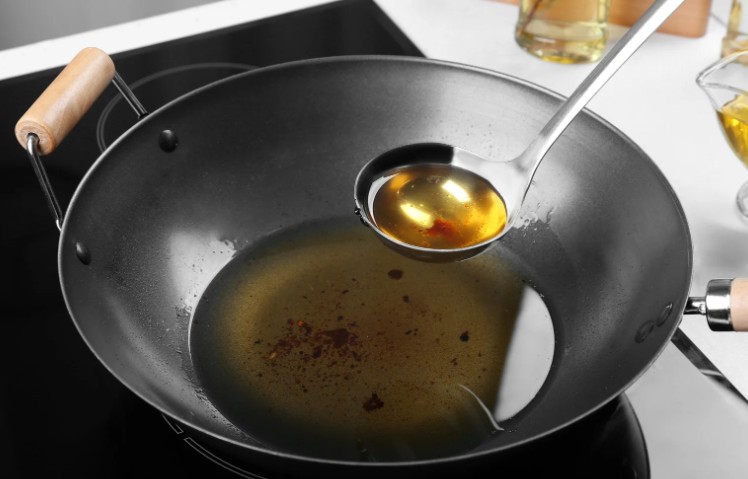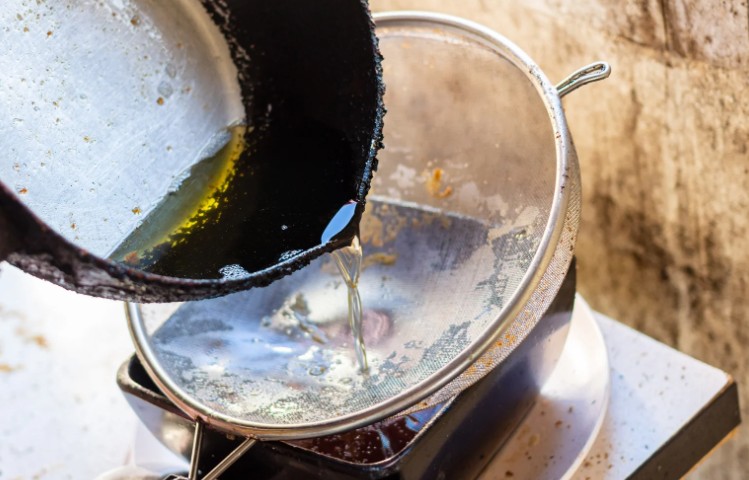- How to Dispose of Cooking Oil UK? — What I’ve Learned Living Here?
- How to Dispose of Cooking Oil Environmentally? — My Step-by-Step Method
- How to Dispose of Cooking Oil from Deep Fryer? — My At-Home Routine
- What Are the Best Ways to Dispose of Cooking Oil at Home in the UK?
- How to Dispose of Out of Date Cooking Oil?
- How Cooking Oil Disposal Methods are Compared?
- What are My Kitchen Checklist for Responsible Oil Disposal?
- Final Thoughts – How I Make My Kitchen Greener Every Day?
- What Are The FAQ On How to Dispose of Cooking Oil?
When I first started cooking regularly at home, I didn’t think twice about pouring leftover oil down the sink. It seemed harmless.
But once I learned how much damage that causes to plumbing and the environment — especially in the UK — I knew I had to change my habits.
In this guide, I’ll walk you through exactly how to dispose of cooking oil at home in the UK, in ways that are safe, responsible, and eco-friendly.
Whether you’re dealing with oil from a pan or a deep fryer, this step-by-step blog shares everything I’ve learned about environmentally friendly oil disposal.
How to Dispose of Cooking Oil UK? — What I’ve Learned Living Here?
Living in the UK, we’re lucky to have well-structured waste management services — but that doesn’t mean it’s okay to pour oil down the drain. Here’s what I discovered:
What Happens If I Pour Oil Down the Drain in the UK?
Pouring oil down the sink might seem easy, but it’s one of the biggest contributors to fatbergs — huge masses of congealed fat, grease, and waste that block UK sewers.
Thames Water has reported clearing fatbergs weighing more than a double-decker bus!

What Do UK Councils Recommend?
Most councils explicitly state on their websites: Do NOT pour oil down the drain. Instead, they recommend:
- Recycling used cooking oil at local Household Waste Recycling Centres (HWRCs)
- Disposing small amounts in general waste after solidifying
- Using oil collection services, where available
How I Follow the Rules in My Own Kitchen?
I keep a sealable container under the sink. After cooking, I let the oil cool, pour it into the container, and once full, I take it to my local recycling point. It’s easy, safe, and I avoid plumbing nightmares.
How to Dispose of Cooking Oil Environmentally? — My Step-by-Step Method
To dispose of cooking oil environmentally, here’s the process I personally follow — combining reuse, recycling, and conscious waste handling.
Step 1: Cool It Down
Let the oil cool completely. Hot oil can melt plastic containers and is dangerous to handle.
Step 2: Filter and Reuse (If Safe)
If the oil is still relatively clean (like from frying chips), I strain it through a coffee filter and reuse it 2–3 times. This reduces waste and saves money.
Step 3: Store in a Resealable Container
I always use a bottle or jar with a secure lid. Label it clearly — especially if you plan to store it before disposal.
Step 4: Choose a Disposal Method
- Small amounts: Solidify with flour or freeze it in a container, then throw in the general waste bin.
- Large quantities: Take it to your nearest HWRC, where cooking oil is often recycled into biofuel.
How to Dispose of Cooking Oil from Deep Fryer? — My At-Home Routine
Using a deep fryer means dealing with a lot more oil. Here’s how I manage it responsibly:
Can I Reuse First?
Deep fryer oil is typically cleaner after one use. I filter it and reuse it up to 3 times — but always discard if it smells bad or turns dark.

How To Store Properly?
Once it’s no longer usable, I pour it into a strong plastic bottle or glass jar. Never in flimsy containers — they can leak or burst.
Where I Take It?
Because I use several litres over time, I collect it in bulk and drop it off at my local recycling centre. Many of these centres in the UK accept used cooking oil specifically from domestic kitchens.
Tip: Some biodiesel companies even offer free home collection in certain areas. I once booked one through a local Facebook group!
What Are the Best Ways to Dispose of Cooking Oil at Home in the UK?
If you’re like me — cooking often and wanting to stay eco-friendly — here are the best at-home methods I swear by:
1. Reuse When Possible
- Great for shallow frying or deep frying in clean conditions
- Strain the oil and then store in a labelled jar or container
- Helps reduce overall oil consumption
2. Solidify and Bin
- Mix hot oil with flour, sawdust, or even cat litter
- Let it cool and harden
- Place it in a compostable or biodegradable bag and then into general waste
3. Freeze the Oil
- For messy or greasy oil, I pour it into a disposable container and freeze it
- Easy to toss once it’s a solid block
4. Recycle at Your Nearest Centre
- Most UK Household Waste Recycling Centres accept cooking oil
- You can check your postcode on Recycle Now
5. Never Do This:
- Never pour oil down the sink, toilet, or outside in the garden
- It clogs pipes and harms wildlife

How to Dispose of Out of Date Cooking Oil?
Out-of-date cooking oil shouldn’t go into your meals — but it still doesn’t belong in the drain.
Can I Still Recycle It?
Yes, expired oil can be recycled the same way as used oil. I pour mine into a clean bottle and take it to a recycling centre.
What are the Other Uses for Expired Oil?
- Homemade soap or oil lamps (if you’re crafty)
- Wooden furniture polish (mix with vinegar)
- Just make sure it’s not mouldy or rancid before experimenting
How Cooking Oil Disposal Methods are Compared?
| Disposal Method | Eco-Friendly | Suitable for Home Use | Recyclable | Notes |
| Reuse (filter & store) | Yes | Yes | N/A | Use max 2–3 times |
| Solidify & bin | Yes | Yes | No | Best for small amounts |
| Freeze & bin | Yes | Yes | No | Minimizes mess |
| HWRC recycling | Yes | Yes | Yes | UK-wide availability |
| Pour down drain (DON’T DO THIS) | No | No | No | Damages plumbing & environment |
What are My Kitchen Checklist for Responsible Oil Disposal?
Here’s a simple list I follow:
- ✅ Let oil cool completely
- ✅ Reuse oil when possible (max 2–3 times)
- ✅ Store used oil in a sealed container
- ✅ Take large amounts to your local HWRC
- ✅ Solidify small amounts before binning
- ❌ Never pour oil down the drain or toilet
- ❌ Don’t mix oil with water or cleaning products

Final Thoughts – How I Make My Kitchen Greener Every Day?
Over time, I’ve learned that small changes at home add up to big environmental impacts.
By properly knowing how to dispose of cooking oil — whether it’s from a quick stir-fry or a full-on deep-fried feast — I’m protecting my plumbing, helping reduce fatbergs, and contributing to greener UK cities.
If more of us follow these simple, responsible steps, we can make a real difference — starting right in our kitchens.
What Are The FAQ On How to Dispose of Cooking Oil?
1. How do you dispose of kitchen oil?
I cool it, reuse it if possible, or take it to my local recycling centre in a sealed container. For small amounts, I solidify it and put it in the general waste bin.
2. How to dispose of cooking oil after frying?
I strain the oil to remove crumbs, reuse if it’s still clean, or pour it into a sealed jar for recycling if it’s spent.
3. How to dispose of used cooking oil?
Used cooking oil should never go down the drain. I store mine in a labelled bottle and either reuse it or drop it off at a recycling point.
4. Can I throw oil in the bin?
Yes, but only if it’s a small amount and has been solidified. Liquid oil can leak and create problems in waste collection.
5. Does my council collect used cooking oil?
Some do! I recommend checking your local council’s website or Recycle Now to see if doorstep or drop-off recycling is available.


0 Comments